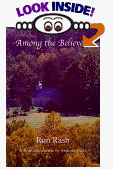| Ron Rash's Among the Believers and Raising the Dead Review: by Brad Bostian | ||


Among the Believers and Raising the Dead I've been up in the mountains with Ron Rash, and I have to say the atmosphere is fine. Echoes of the bloody war still ring through the hollows, and love costs the last straining of each person's muscle and soul. Ghosts stir like wingbeats behind faces, and every overturning of a stone or sorrow is a sign. Plain faces with rich hearts keep facing down life and lie down only for each other and death, and then the lake rises over all of it, Jocassee Reservoir with its blue depths of memory.
The telling of a good story is said to be a southern trait, and an Appalachian talent, and Ron Rash has it. His poems are more event than meditation, but every occurrence shines with the light of understanding the ordinary people who live at the farthest edge of the highest crag of life. Everything they have is not much, but the little they have is everything, and everything is at stake. "If they had hair it was gray, / the backs of their hands wormy / currents of blue veins, old men / the undertaker believed / had already lost too much / to the earth to be bothered / by what they found, didn't find," ("The Men Who Raised the Dead").
"Fishermen have heard it years, / a wailing from deep water / nights the wind settles, the moon / trembles on the lake as if / light not falling but rising, / as if some things cannot be / forever hidden but must / surface" ("Analepsis").
I will admit I love the landscape, the still lakes and icy streams, the scarecrows and dogwood fields of dry grass and granite tumbled about, white churches and mules, shovels and gray planks and small, smoky parlors. That isn't to say the storytelling, or the gothic mountain life are all I love about this poetry. Rash has an ability to inhabit another's life, as easily and convincingly as Rita Dove. And, the lines themselves are fat with images. ". . . before Hawk Ridge snuffed the sun . . ." ". . . the hams hung like hornet's nests . . ." "Cabbage heads piled like slaughter . . ."
This is not to say I have no complaints. At times, the line-breaking is sloppy, as it is in most contemporary poetry, with no rhyme or reason: "trembles on the lake as if" (from "Analepsis:")—why end with "if?"—or even a confused choice of punctuation, as in "The Release:" "In those last moments before / the platter of salt and dirt / lay on his stomach, wax-light / had waved across a mute heart, his son waited by the bed." There seems to be an extra sentence stuck into the middle of that passage.
Other times there is a rashness (his pun, not mine) to the lines, as if the poet has to scratch down so much so quickly before the quill dries out. Sentences start mid-line, or go line after line until the end of the poem. Occasionally the images jumble up against themselves in their stampede to get out. "All we can know / is God's watch measured Ezra Whitfield's time / so Isaac Hampton's Crime was our Lord's will, / which is no crime unless our pride would judge / the apple's fall, the barn owl's dark, clawed sight, / the weasel's fierce appetite, this son / I fathered so our Father's will might raise / a rusty owlshead pistol to the chest / of Ezra Whitfield, Isaac's closest friend" ("The Preacher is Called to Testify for the Accused").
In "The Confession," there is only one sentence, and while that rush of
words fits the breathlessness of contrition, the lack of punctuation seems a little loose
even for half-wild mountain folk. One could imagine a poet like Merwin, penning his verse
in balmy
Rash's two books overlap, but with Among the Believers being more of a scrabbling toward the divine, and Raising the Dead a peering down into the depths of lost life. Neither let go of me when I turned the final page, and neither has quite let go of me since. As a poet, you can only make art by writing a good poem, but you can't make a good poem by writing art. I feel like Ron Rash understands that. He knows how to make a good poem. He tells a good story too.
Brad Bostian is a contributing editor for ForPoetry.com. Click here to read more reviews by Bran Bostian. |